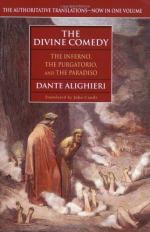“I was of Lombardy, and Marco call’d:
Not inexperienc’d of the world, that worth
I still affected, from which all have turn’d
The nerveless bow aside. Thy course tends right
Unto the summit:” and, replying thus,
He added, “I beseech thee pray for me,
When thou shalt come aloft.” And I to
him:
“Accept my faith for pledge I will perform
What thou requirest. Yet one doubt remains,
That wrings me sorely, if I solve it not,
Singly before it urg’d me, doubled now
By thine opinion, when I couple that
With one elsewhere declar’d, each strength’ning
other.
The world indeed is even so forlorn
Of all good as thou speak’st it and so swarms
With every evil. Yet, beseech thee, point
The cause out to me, that myself may see,
And unto others show it: for in heaven
One places it, and one on earth below.”
Then heaving forth a deep and audible sigh,
“Brother!” he thus began, “the world
is blind;
And thou in truth com’st from it. Ye,
who live,
Do so each cause refer to heav’n above,
E’en as its motion of necessity
Drew with it all that moves. If this were so,
Free choice in you were none; nor justice would
There should be joy for virtue, woe for ill.
Your movements have their primal bent from heaven;
Not all; yet said I all; what then ensues?
Light have ye still to follow evil or good,
And of the will free power, which, if it stand
Firm and unwearied in Heav’n’s first assay,
Conquers at last, so it be cherish’d well,
Triumphant over all. To mightier force,
To better nature subject, ye abide
Free, not constrain’d by that, which forms in
you
The reasoning mind uninfluenc’d of the stars.
If then the present race of mankind err,
Seek in yourselves the cause, and find it there.
Herein thou shalt confess me no false spy.
“Forth from his plastic hand, who charm’d
beholds
Her image ere she yet exist, the soul
Comes like a babe, that wantons sportively
Weeping and laughing in its wayward moods,
As artless and as ignorant of aught,
Save that her Maker being one who dwells
With gladness ever, willingly she turns
To whate’er yields her joy. Of some slight
good
The flavour soon she tastes; and, snar’d by
that,
With fondness she pursues it, if no guide
Recall, no rein direct her wand’ring course.
Hence it behov’d, the law should be a curb;
A sovereign hence behov’d, whose piercing view
Might mark at least the fortress and main tower
Of the true city. Laws indeed there are:
But who is he observes them? None; not he,
Who goes before, the shepherd of the flock,
Who chews the cud but doth not cleave the hoof.
Therefore the multitude, who see their guide
Strike at the very good they covet most,
Feed there and look no further. Thus the cause
Is not corrupted nature in yourselves,
But ill-conducting, that hath turn’d the world




